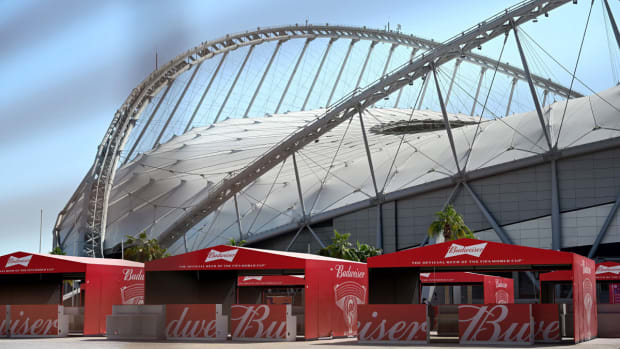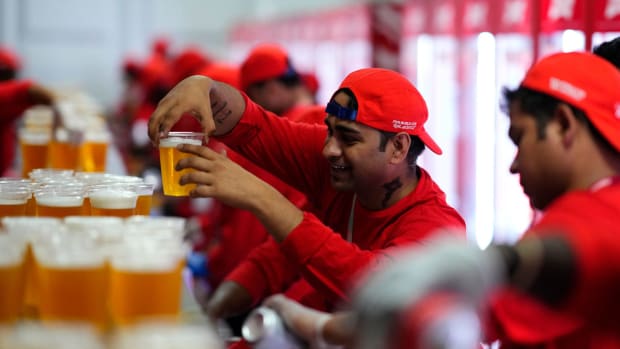DOHA, Qatar – On Saturday evening, on the fifth floor of the Crowne Plaza hotel, one solution to what has become the World Cup’s first-week crisis is revealed. The answer lies in the name of this establishment: Brewskis and Grub, a restaurant that serves pub food, is decorated with flags from all over the world, plays soccer on its myriad flatscreens and delivers something that has been endlessly debated.
Beer.
When Brewskis opens at 5 p.m., it’s empty, save for a staff from all over the world. In the corner, near the bar, there’s a sign made from light bulbs that glows like a water station in the, well, desert. BEER YOURSELF it says in neon lights, next to an image of a frosty mug with a slogan—it’s ok to tap it!—glowing red inside.
The sign is literal, in that there are taps below it. Those taps work with cards that can be purchased. Grab a frosty mug, place the card against a scanner, pour, watch the balance whittle away by the ounce and … voila. It’s time to go full Homer Simpson.
Fans the world over can buy beer—and wine and booze—all over Doha, at hotels with licenses and exorbitant upcharges. (The $12.36 at Brewskis for a—gulp—Budweiser is actually cheaper than most places). But the sentiment that’s being peddled by the host country and its FIFA enablers—that it’s not hard to find alcohol, so it shouldn’t matter if it’s sold in stadiums—is little more than clumsy, intentional misdirection.
It's not about the beer. It never was—not 12 years ago, when Qatar netted the bid; not more recently, when officials announced beer would be sold in stadiums for three hours before games and one hour afterward; and not Friday, when the host nation abruptly reversed course.

Miguel Medina/AFP/Getty Images
No, this is about Qatar. It’s also about hypocrisy, power, control, messaging and a certain finger being raised and directed at a very specific place. By making it about beer, culture, values and the dreaded West, the Qatari government and FIFA are trying to change the subject.
None of the logic tracks, and that’s because it’s not logic at all. If this were truly about culture, why will well-off soccer fans and VIPs, ensconced in stadium luxury suites that cost around $3,000 a ticket and were built by migrant workers in sub-human conditions, be able to drink? And not just beer, but top-shelf whiskey and vodka and the rest, along with wine chosen by sommeliers. Meanwhile, regular fans, many of whom used savings to buy tickets, not to mention flights, hotel rooms and everything else, will be treated to a second-class experience.
If this were really about values, in a region where alcohol is tolerated in some places and outright illegal in others, why is anyone talking about beer in the first place? The same government officials and FIFA lapdogs who fear the almighty hops will stage a tournament in the same places where thousands of migrant workers died building eight palatial stadiums, while displacing thousands more to create space. There are still reports that members of the LGBTQ community are being arrested here, where spousal rape is not illegal but things like shorts and public displays of affection are frowned upon or not allowed.
It’s about the beer, right?
No. It’s about a government that secured a World Cup bid and then spent years trying to appear contrite and humble about its record on human rights, a government that said, over and over, that it would relax restrictions for visitors and then, with beer specifically, moved the goalposts 48 hours before Sunday’s opener. The beer isn’t the issue. The issue is what Qatar might change its mind about next.
Here's a quick recap of perhaps the most ridiculous back-and-forth ever held at a major sporting event. Call it, The Great Beer Wars. Budweiser became one of FIFA’s main sponsors in 1986, while Qatari officials began their pitch in 2009. Part of their sell was that alcohol would be more widely available. Those same officials constructed a fan zone on Doha’s outskirts in 2019, as part of the Club World Cup, a test run of sorts. Booze was sold for hours every day but fans were forced to journey 45 minutes for their fix. Now, there are two fan zones that sell alcohol much closer to the action. (And it seems likely their booze supply just got an exponential boost!)
Last Monday, The New York Times reported that beer tents must be moved, at the direction of the government, “end of discussion.” Budweiser, which reportedly paid $75 million for its sponsorship rights, told the newspaper, in a statement, that it first learned of the new plan the day before. The subsequent news release, meanwhile, hit on all the misdirection talking points, a mishmash of “pouring times” and “pouring destinations” and vague language meant as filibuster, to say something without saying anything at all.
On Tuesday, the NYT’s Tariq Panja noted that staff members wearing yellow safety vests were rolling Budweiser-logoed beer tents to “new locations.”

Petr David Josek/AP
Then, on Friday, 48 hours before the start of the tournament, the about-face became official. This World Cup, at least for casual stadium-goers, would be non-alcoholic. What always seemed likely now appeared to be obvious. Qatar, not FIFA or anyone else, would control the tournament. Budweiser pulled a tweet-and-delete that said it all: Well, this is awkward … the post read.
Eight years ago, in Brazil, the international soccer czars pressured the host country for the opposite, for beer to be sold in stadiums. Here, they not only capitulated, they pushed Budweiser Zero, a notion that’s offensive on taste profile and general enjoyment alone.
On Saturday, FIFA officials also bit back. There was the organization’s president, Gianni Infantino, delivering an hourlong missive in a well-appointed auditorium full of journalists. This time, he didn’t limit his remarks to beer. Instead, he lectured on “hypocrisy” and “moral lesson-giving.” He defended customs and laws that no one should defend, adding a “crucify me” like he was the one forced to deal with injustice. At the same time, he had the temerity to attempt to reassure gay fans that they were safe here and always had been, while defending Qatar’s record on human rights. It sounded like an audition for the role of Bond villain. May he drink Budweiser Zero for the rest of his days.
Infantino won’t be alone in damage done that cannot be repaired. Qatar’s government has said that, in hosting the World Cup, it wanted to show more than a million fans what the country is really like. That’s the thing. Everyone can see. It’s just not what they want to show.
Qatar is in charge here, not FIFA, and beer suddenly not being sold at stadiums is most problematic because of what it hints at, what might be coming. Construction for the World Cup’s infrastructure is still ongoing, despite the opener scheduled in less than 24 hours. The country’s World Cup ambassador, Khalid Salman, described homosexuality as “damage in the mind” and warned gay fans that they “have to accepted our rules” – all of two weeks ago. There are reports, like one in the Sunday Times, that the government here is using private investigators to “target” journalists. The Sunday Times said the same government threatened legal action over that story.
Meanwhile, the soccer starts Sunday. But even the opener between Qatar and Ecuador raises another critical question: will the actual tournament even matter anymore? It’s safe to say, not as much as it would have, if held somewhere else, by someone else. Before a single match has begun, FIFA—and fans all over the world—have already lost.
Back at Brewskis and Grub, a man from England sat down at a table. If beer were really the issue, why was he the second person to arrive an hour after the restaurant opened?
Asked about the topic of the tournament, he said, “It’s just beer, man,” then added, “this is all so f---ed up.”







